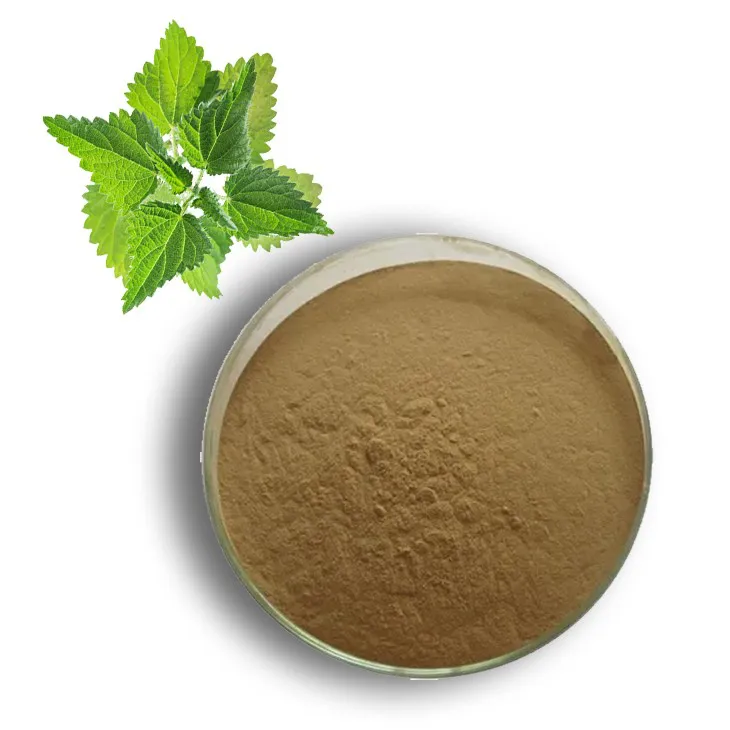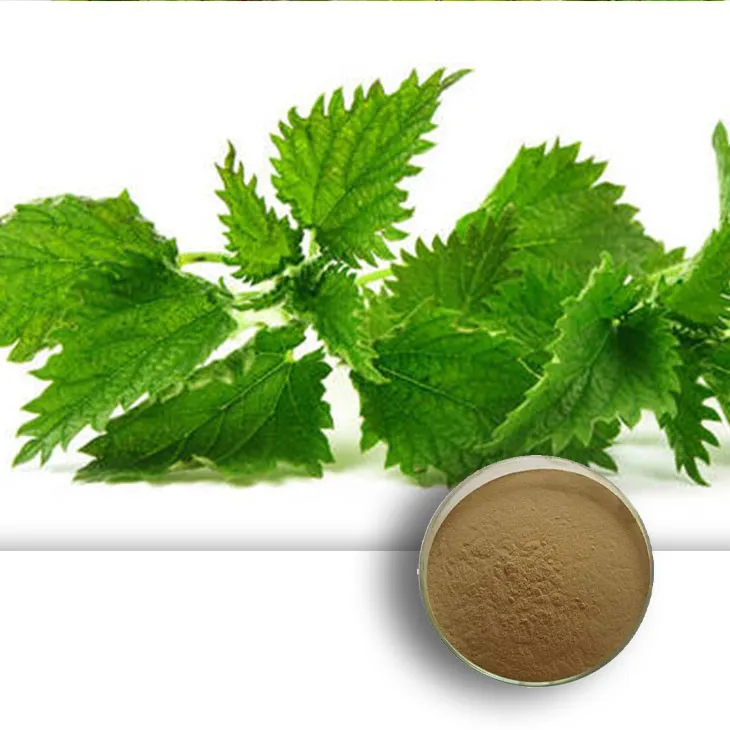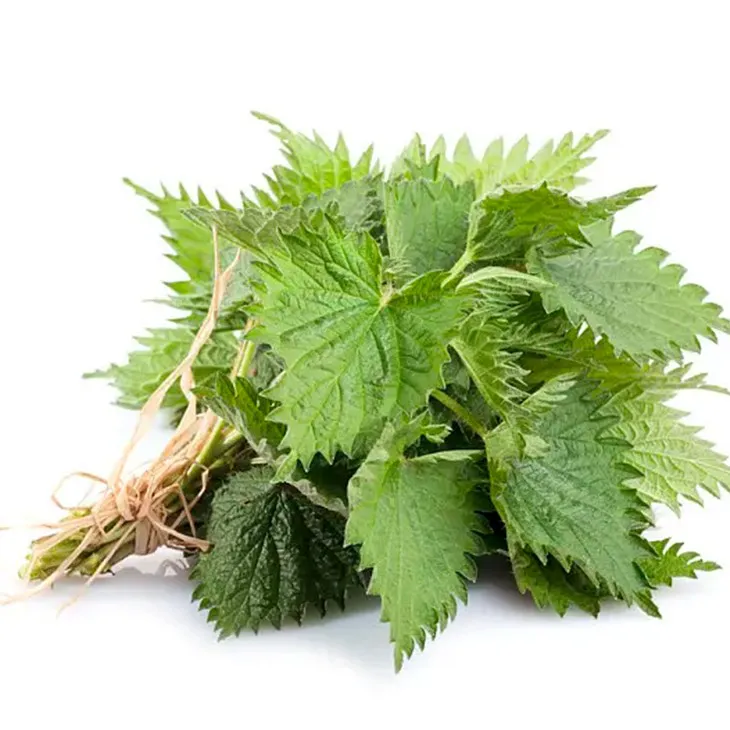- 0086-571-85302990
- sales@greenskybio.com
Nettle leaf extract: Is the extract effective for weight loss?
2024-11-14

1. Introduction
In the modern era, obesity has become a global epidemic, leading to numerous health problems such as diabetes, heart disease, and hypertension. As a result, there is a growing interest in natural remedies for weight loss. Nettle leaf extract has emerged as a potential candidate in this regard. Nettle (Urtica dioica) is a plant that has been used for centuries in traditional medicine for various purposes. But the question remains: is Nettle leaf extract truly effective for weight loss? This article aims to explore this question by examining its effects on metabolism, appetite suppression, and fat - burning mechanisms through scientific research and studies.

2. Nettle leaf extract: An Overview
Nettle is a perennial herbaceous plant that is found in many parts of the world. The leaves of the nettle plant are rich in various bioactive compounds, including polyphenols, flavonoids, and alkaloids. These compounds are believed to be responsible for the potential health benefits of nettle leaf extract. The extract can be obtained through various methods, such as solvent extraction or steam distillation. It is available in different forms, including capsules, powders, and tinctures.

3. Metabolism and Nettle Leaf Extract
3.1 Thermogenesis
One of the ways in which nettle leaf extract may contribute to weight loss is through thermogenesis. Thermogenesis is the process by which the body generates heat, and it can increase energy expenditure. Some studies suggest that certain compounds in nettle leaf extract, such as flavonoids, may stimulate thermogenesis. For example, a study on rats showed that nettle leaf extract administration led to an increase in body temperature, indicating enhanced thermogenesis. However, it is important to note that these results may not directly translate to humans, as the physiological mechanisms in rats and humans can differ.
3.2 Basal Metabolic Rate (BMR)
Another aspect of metabolism that nettle leaf extract may influence is the basal metabolic rate. The BMR is the amount of energy the body needs to perform basic functions at rest. There is some evidence to suggest that nettle leaf extract can increase BMR. A small - scale human study found that participants who took nettle leaf extract supplements for a certain period had a slightly elevated BMR compared to those in the control group. However, the increase was relatively small, and more research is needed to confirm the significance of this effect in the context of weight loss.

4. Appetite Suppression by Nettle Leaf Extract
Controlling appetite is a crucial factor in weight loss. Nettle leaf extract may have an impact on appetite suppression. Some of the bioactive compounds in nettle, such as certain alkaloids, may act on the satiety centers in the brain. In a pre - clinical study, animals that were given nettle leaf extract showed a reduction in food intake compared to the control group. However, when it comes to human studies, the evidence is less conclusive. Some participants in a small - scale trial reported a decrease in appetite after taking nettle leaf extract, but the overall effect was not consistent across all participants. There could be several reasons for this, including individual differences in metabolism and the complex interplay of hormones involved in appetite regulation.
5. Fat - Burning Mechanisms
5.1 Lipolysis
Lipolysis is the process by which the body breaks down stored fat into fatty acids and glycerol for energy. Nettle leaf extract may play a role in promoting lipolysis. Some in - vitro studies have shown that certain compounds in nettle can activate enzymes involved in lipolysis. For example, flavonoids in nettle leaf extract have been shown to stimulate the activity of lipase, an enzyme that breaks down fats. However, in - vivo studies in humans are needed to determine whether these effects can actually lead to significant fat loss in the body.
5.2 Fat Oxidation
Fat oxidation is another important aspect of fat - burning. Nettle leaf extract may enhance fat oxidation in the body. Some research suggests that the polyphenols in nettle can increase the activity of mitochondria, the powerhouses of the cells where fat oxidation takes place. A study on athletes showed that supplementation with nettle leaf extract led to an increase in fat oxidation during exercise. However, it is unclear whether this effect is strong enough to contribute significantly to weight loss in non - athlete populations.
6. Scientific Research and Studies
Although there have been some promising findings regarding the potential of nettle leaf extract for weight loss, the overall body of scientific research is still relatively limited. Most of the studies conducted so far have been small - scale, either in animals or in a small number of human participants. For example, a study on a group of obese individuals found that nettle leaf extract supplementation, combined with a balanced diet and exercise, led to a modest reduction in body weight over a period of several weeks. However, the lack of large - scale, long - term studies makes it difficult to draw definitive conclusions about the effectiveness of nettle leaf extract for weight loss.
Additionally, many of the studies have focused on specific aspects such as thermogenesis or lipolysis, rather than looking at the overall impact on weight loss. There is also a need for more research to understand the potential side effects of nettle leaf extract, especially when used over a long period for weight loss purposes.
7. Conclusion
In conclusion, while there are some indications that nettle leaf extract may have potential benefits for weight loss through its effects on metabolism, appetite suppression, and fat - burning mechanisms, the evidence is not yet conclusive. The current scientific research is limited, and more large - scale, long - term studies are needed. Nettle leaf extract may be a part of a comprehensive weight loss strategy that includes a balanced diet and regular exercise, but it should not be considered a magic solution on its own. Individuals who are considering using nettle leaf extract for weight loss should also consult with a healthcare provider to ensure its safety and effectiveness in their specific case.
FAQ:
1. What is nettle leaf extract?
Nettle leaf extract is derived from the leaves of the nettle plant. It contains various bioactive compounds such as flavonoids, phenolic acids, and polysaccharides. These components are thought to have potential health - related effects, including possible implications for weight loss.
2. How might nettle leaf extract affect metabolism?
Some studies suggest that nettle leaf extract could potentially influence metabolism. It may enhance thermogenesis, which is the process by which the body generates heat and burns calories. However, the exact mechanisms are not fully understood. It could interact with enzymes involved in energy metabolism or have an impact on mitochondrial function, which plays a crucial role in the body's energy production.
3. Does nettle leaf extract suppress appetite?
There is some evidence indicating that nettle leaf extract may have an appetite - suppressing effect. It could potentially act on the hormones in the body that regulate hunger and satiety, such as ghrelin and leptin. However, more research is needed to confirm these effects and to understand the extent to which it can actually reduce food intake in a practical setting.
4. What are the fat - burning mechanisms of nettle leaf extract?
Nettle leaf extract may promote fat - burning through multiple mechanisms. It could enhance the breakdown of stored fat (lipolysis) by activating certain enzymes in the body. Additionally, it may improve the body's ability to utilize fatty acids for energy production. However, these mechanisms are still being investigated, and the overall impact on significant fat loss in humans remains to be clearly determined.
5. Are there any side effects of using nettle leaf extract for weight loss?
While nettle leaf extract is generally considered safe for most people when used in moderation, some individuals may experience side effects. These can include mild digestive issues such as nausea, diarrhea, or stomach discomfort. In some cases, skin irritation may occur if the extract comes into contact with the skin. It is also important to note that if you have certain medical conditions or are taking medications, it is advisable to consult a healthcare provider before using nettle leaf extract for weight loss.
Related literature
- The Effects of Nettle Leaf Extract on Metabolism: A Comprehensive Review"
- "Nettle Leaf Extract and Appetite Regulation: Current Research Findings"
- "Investigating the Fat - Burning Properties of Nettle Leaf Extract"
- ▶ Hesperidin
- ▶ Citrus Bioflavonoids
- ▶ Plant Extract
- ▶ lycopene
- ▶ Diosmin
- ▶ Grape seed extract
- ▶ Sea buckthorn Juice Powder
- ▶ Fruit Juice Powder
- ▶ Hops Extract
- ▶ Artichoke Extract
- ▶ Mushroom extract
- ▶ Astaxanthin
- ▶ Green Tea Extract
- ▶ Curcumin
- ▶ Horse Chestnut Extract
- ▶ Other Product
- ▶ Boswellia Serrata Extract
- ▶ Resveratrol
- ▶ Marigold Extract
- ▶ Grape Leaf Extract
- ▶ New Product
- ▶ Aminolevulinic acid
- ▶ Cranberry Extract
- ▶ Red Yeast Rice
- ▶ Red Wine Extract
-
Bitter Melon Extract
2024-11-14
-
Grape Seed Extract
2024-11-14
-
Baicalin
2024-11-14
-
Resveratrol extract
2024-11-14
-
Cassia Seed Extract
2024-11-14
-
Hericium erinaceus extract powder
2024-11-14
-
Red Vine Extract
2024-11-14
-
Angelica sinensis extract
2024-11-14
-
Clove Powder
2024-11-14
-
Yellow Pine Extract
2024-11-14





















